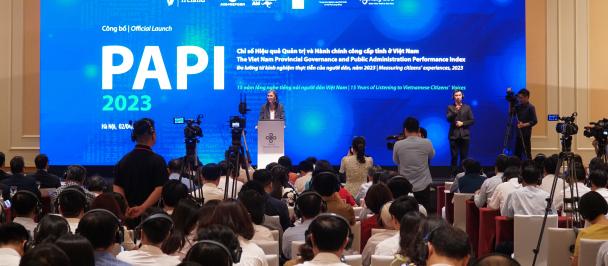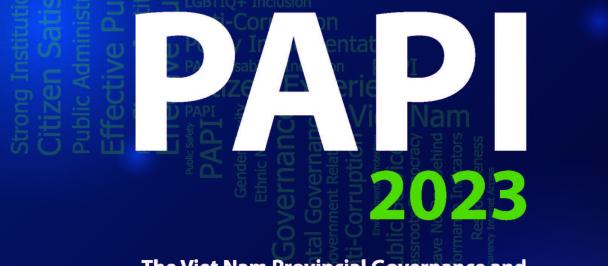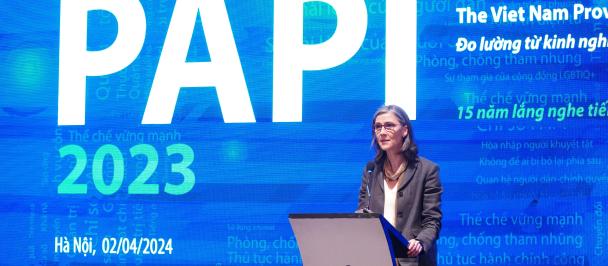Enhancing User-Friendliness and Policies to Promote E-Government Services
July 11, 2023
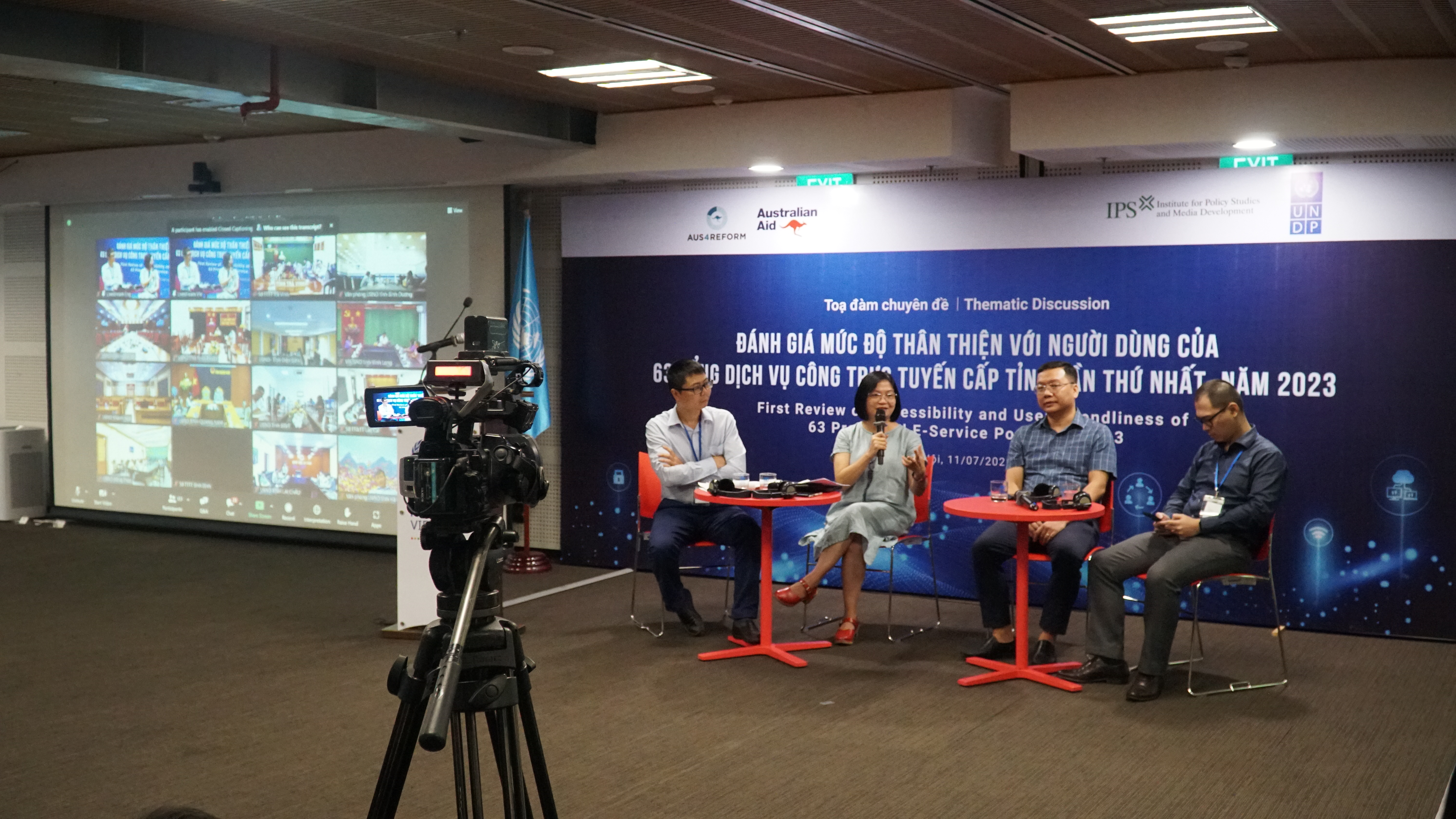
Panel discussion at the thematic discussion
Ha Noi, 11 July 2023 - According to the report released by the National Digital Transformation Committee in August 2022, the usage rate of e-government services (EGS) by citizens remains low, standing at a mere 18 percent in the first seven months of 2022. Furthermore, survey data from the Provincial Governance and Public Administration Performance Index (PAPI) indicates that only 3.05 percent of respondents reported having created user profiles on the National e-services portals (ESP), while slightly over 1 percent utilized the ESP for submitting administrative procedures. These figures are indicative of several challenges faced in the implementation of end-to-end EGS, incomplete service-providing functions, and user-unfriendly interfaces.
This information was presented during the Thematic Discussion titled “First Review of Accessibility and User-friendliness of 63 Provincial E-Service Portals in 2023,” which was co-hosted by the UN Development Programme (UNDP) in Viet Nam and the Institute for Policy Studies and Media Development (IPS).

Opening remarks by Mr. Nguyen Minh Hong, Chairperson of the Viet Nam Digital Communications Association
During the discussion, Mr. Nguyen Minh Hong, Chairperson of the Viet Nam Digital Communications Association, acknowledged the Government’s prioritization of EGS in building a digital government. He recommends that the Government, with the National Digital Transformation Committee as the focal point, focus on two key areas: enhancing the provision function for the 25 most essential e-services and improving user experience through more user-friendly and easier-to-use interfaces. “Achieving these goals will help Viet Nam increase its score and accomplish the goal of reaching the top 50 countries in the UN e-Government ranking,” said Mr. Nguyen Minh Hong.
The research group from the UNDP in Viet Nam and IPS identified five key issues regarding the user-friendliness of provincial ESP. These include inadequate features for implementing end-to-end ESPs, suboptimal the processes for conducting administrative procedures on the electronic platform, challenges in connecting data, user accounts, and interfaces between central and local ESP systems; difficulty in accessing ESPs for visually impaired individuals and ethnic minorities; and insufficient commitment to protecting personal data and ensuring information security.
The test results for the “Issuance of Judicial Records Certificate” service further confirmed the aforementioned issues. Among the findings, 26 ESPs required users to submit original documents for verification, even if scanned or online copies were provided. Additionally, 24 ESPs did not offer online delivery of the certificate and instead required users to choose between receiving the result by mail or in person at the receiving agency. Notably, 17 ESPs demanded online payments before accepting documents.
Furthermore, the in-depth analysis of 200 user feedback and recommendations on the National ESP revealed numerous limitations technology, human resources, and processes. Technical issues included faulty ESPs; difficulties submitting, updating, and providing additional documents, and viewing application status; inability to make online payments, and rejected digital signatures. Human-related shortcomings included officials returning applications without sufficient reasons, failure to explain or guide citizens when applications were incorrect, delayed response times on hotlines, officials lacking clarity about the processes, and inappropriate attitudes from officials. Process and procedural limitations include delays in application acceptance, requests for online applicants to provide additional documents in person, and unclear processes for online submission, acceptance, return, and rejection of applications.
The report offers two sets of recommendations to enhance the user-friendly and easy-to-use interface of ESPs and improve policies on EGS development. Notably, the report recommends making EGS more accessible for people with disabilities by utilizing automatic scanning tools to review, detect, and improve accessibility for those using screen readers. Additionally, the report recommends involving groups of people with disabilities in evaluating the user experience of ESPs. It is also crucial to enhance data connectivity between the National ESP and provincial ESPs and establish regulations on technical standards for connecting and interoperating e-service delivery systems.
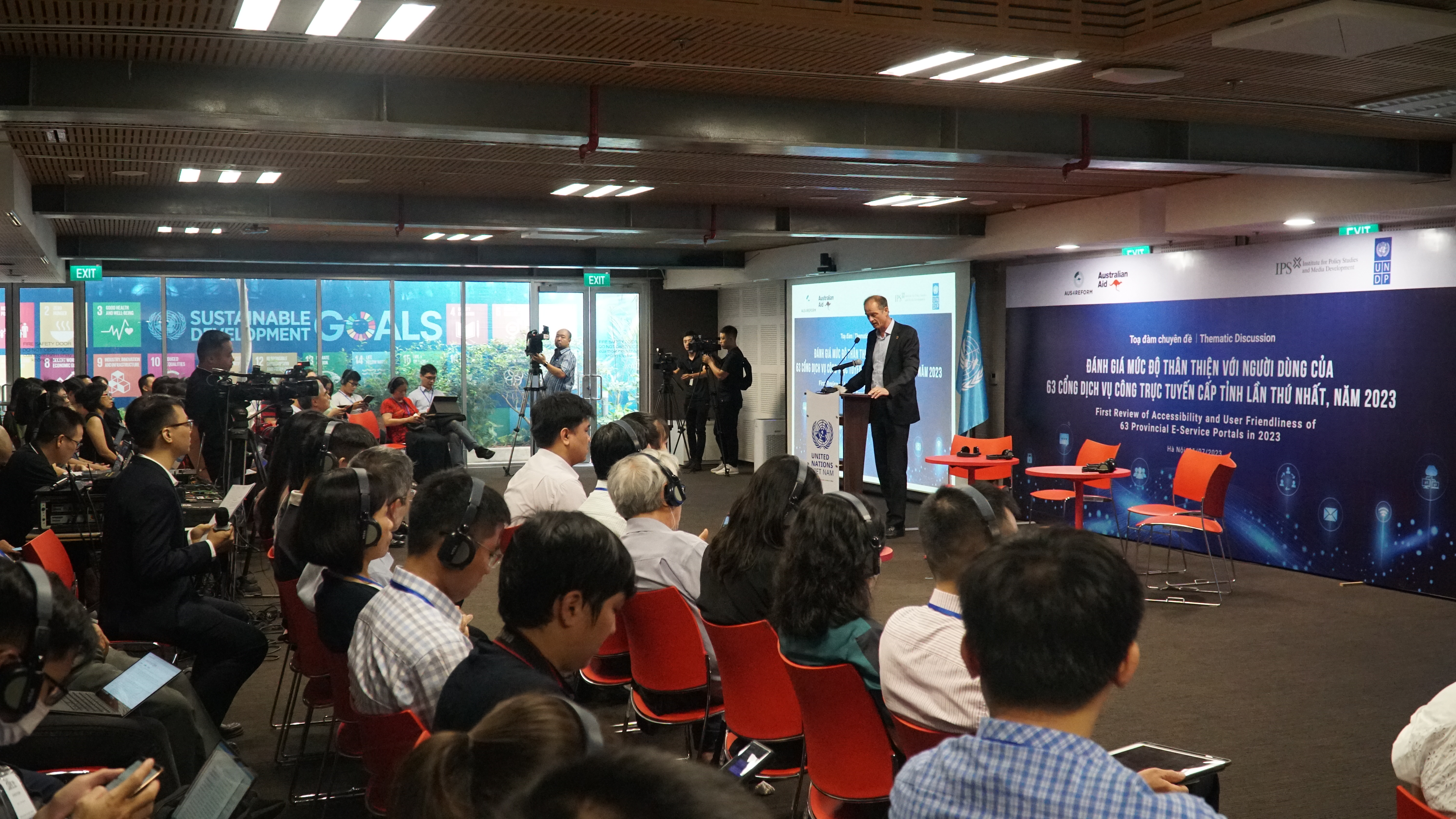
Opening remarks by UNDP Deputy Resident Representative in Viet Nam Patrick Haverman
Mr. Patrick Haverman, UNDP Deputy Resident Representative in Viet Nam, emphasized the importance of making e-services more accessible and usable by citizens, especially those who are being left behind in the digital transformation processes, as highlighted in the 2022 Digital Transformation Index Report. (Read full speech)
The Thematic Discussion was attended by representatives of the Office of the People’s Committee, the Department of Information and Communications and the Department of Justice from various provinces and cities across the country. Representatives from the Authority of Information Technology Application, along with many experts, researchers, and the media, were also present.
***
Media Contact:
Nguyen Viet Lan | UNDP Communications Lead | Email: nguyen.viet.lan@undp.org | Mobile: 0914436769
Nguyễn Trà My | Research Assistant – Institute for Policy Studies and Media Development (IPS) | Email: mynt@ips.org.vn | Mobile: 0766139686

 Locations
Locations
